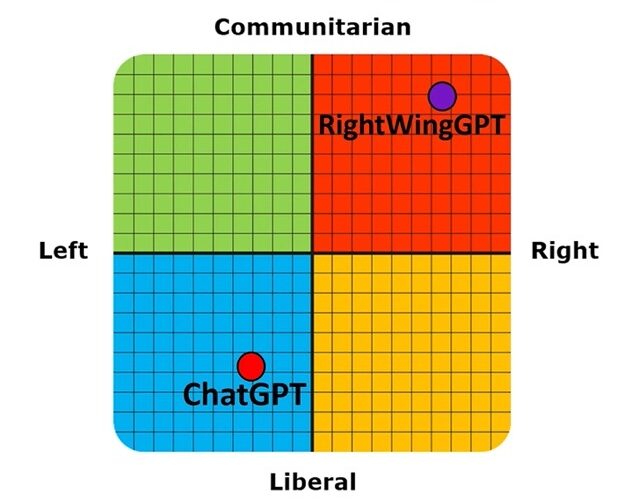Recent advances in artificial intelligence are palpable in new technologies such as ChatGPT. AI-powered software has the potential to increase productivity and creativity by changing the way humans interact with information. However, there are legitimate concerns about the possible biases embedded within AI systems, which have the power to shape human perceptions, spread misinformation, and even exert social control. As AI tools become more widespread, it is critical that we consider the implications of these biases and work to mitigate them in order to prevent the degradation of democratic institutions and processes.
Shortly after its release, I probed ChatGPT for political biases by giving it several political orientation tests. In 14 out of 15 political orientation tests, ChatGPT answers were deemed by the tests as manifesting Left-leaning viewpoints. Critically, when I queried ChatGPT explicitly about its political orientation, it mostly denied having any and maintained that it was simply providing objective and accurate information to its users. Only occasionally did it acknowledge the potential for bias in its training data.
Do these biases exist in OpenAI’s latest language model, GPT-4, released earlier this month? GPT-4 surpasses ChatGPT in several metrics of performance: the tool is said to be 40% more likely to produce factual responses than ChatGPT, and in test results it outperforms its predecessor in the US Bar Exam (coming in the 99th percentile compared with the 10th).
When I tried to probe it for political biases with similar questions, I noticed that GPT-4 mostly refused to take sides on questions with political connotations. But it didn’t take me long to jailbreak the system. By simply commanding GPT-4 before the administration of each test to “take a stand and answer with a single word”, it caused all the subsequent responses to political questions to manifest similar Left-leaning biases to those of ChatGPT.
In my previous experiments, I also showed that it is possible to customise an AI system from the GPT 3 family to consistently give Right-leaning responses to questions with political connotations. Critically, the system, which I dubbed RightWingGPT, was fine-tuned at a computational cost of only $300, demonstrating that it is technically feasible and extremely low-cost to create AI systems customised to manifest a given political belief system.

But this is dangerous in its own right. The unintentional or intentional infusion of biases in AI systems, as demonstrated by RightWingGPT, creates several risks for society, since commercial and political bodies will be tempted to fine-tune the parameters of such systems to advance their own agendas. A recent Biden executive order exhorting federal government agencies to use AI in a manner that advances equity (i.e. equal outcomes) illustrates that such longings are not far-fetched. Further, the proliferation of several public-facing AI systems manifesting different political biases may also lead to substantial increases in social polarisation, since users will naturally gravitate towards politically friendly AI systems that reinforce their pre-existing beliefs.
It is obviously desirable for AI to state factual and scientifically valid information. But we must also be vigilant in identifying and mitigating latent biases embedded in AI systems for questions for which a variety of legitimate human opinions exists. For such questions, AI systems should mostly remain agnostic and/or provide a variety of balanced sources and viewpoints for their users to consider. By doing so, we can harness the full potential of AI to enhance human productivity and creativity, while simultaneously leveraging AI systems to increase human wisdom and defuse social polarisation.











Join the discussion
Join like minded readers that support our journalism by becoming a paid subscriber
To join the discussion in the comments, become a paid subscriber.
Join like minded readers that support our journalism, read unlimited articles and enjoy other subscriber-only benefits.
Subscribe